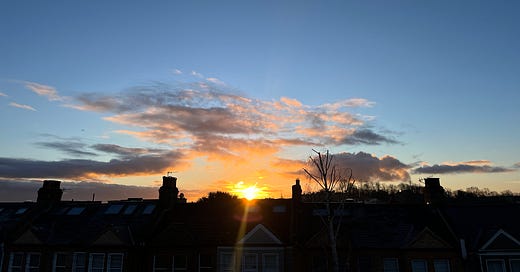Atelier WeekNotes w/c 26 Feb 2024
Priorities: Tracking progress on 2024 intentions. 0/DETECTING: EHF Impact Springboard: 'Transformative Ventures with Global Impact'. Outputs: UCL Module 4.(b) Sustainable finance.
I am writing newsletter of #weeknotes of starting the Atelier of What’s Next (a studio for initiatives at the frontier of generating a better future). For my rationale for starting the Atelier see here.
Normal service! A full-fat WeekNotes! Despite a family crisis, which I hope to write about when it has calmed. Hey ho.
Before we get to that, a final call for donations. In memory of my late wife, Jo, I did the 10km London Winter Run for Cancer Research UK in a personal best of 46:41 (no one more surprised than me to knock 5 mins off my previous PB). As I type, people have very kindly donated £1,626. If you feel moved and able, you can contribute here.
This week covers:
Priorities: Tracking progress on 2024 intentions.
Progress on the story I want to be able to tell.
Tracking objectives
0/DETECTING
EHF Impact Springboard: 'Transformative Ventures with Global Impact'.
Outputs: UCL Module 4.(b) Sustainable finance.
How can the Atelier of What's Next be of service to you, and your purposes? We'd love to hear from you. Perhaps you have a challenge or idea to put in the studio. Maybe one of our existing topics appeals to you. What if you love to make new things happen by being part of the studio? Or if you have feedback or comments that would improve this deck. Either click the button below or email davidbent@atelierwhatsnext.org.
Priorities
Tracking progress on 2024 intentions
We are already one sixth of the way through the year. How are things going on the what success looks like for 2024? This is the year of 'learning by trying'.
In my very first post of the year I gave two ways in to my intentions for the year: the story I wanted to be able to tell in Jan 2025, and the objectives, a combination of regular routines (e.g. each month go through the portfolio of initiatives to check what steps are needed in the month) and outputs (e.g. set up an advisory group). Here is progress using those two articulations:
Progress on the story I want to be able to tell.
(I'd love to put this in a table, but SubStack doesn't do tables. So, the desired headline is in bold and the commentary in italics.)
A year of strong progress and the fundamentals in place. POSSIBLE. The main challenge in the first 2 months has been various family crises and/or health scares which have taken up so much time (you can get a flavour in this tale of interacting with the NHS). One of the family challenges is likely to need time and attention into the summer. As a widower, I need prioritise my children. So, all of the Atelier stuff might be slowed down.
A big highlight was the launch of [a specific project]. ON TRACK. The State of Sustainable Shipping has pilot funding, announced by Lloyds Registry Foundation here. Assuming we (the Sustainable Shipping Initiative, myself and various collaborators) manage to deliver, then SoSS will be the big highlight and calling card. All WeekNotes with SoSS are gathered under this tag.
The huge theme of the year has been learning-by-doing. NEEDS ATTENTION. The pressure of the private life crises has reduced the WeekNotes to FortnightNotes, which slows my learning rate. I've not
As result of our fast learning cycles, we have re-shaped our offer. ON-TRACK. I've been getting some approaches by people intrigued by the Atelier. I have a chance to do a webinar, which will be a rehearsal for taster sessions. The method inside the SoSS (note to self: it needs a name) is something which will be able to be tried out elsewhere from April-ish onwards. I've been talking to people who might want to be part of that first phase of use (equivalent to the alpha or beta testing stage).
All this is only possible because the Atelier now has [at least 2 part-time] co-founders. POSSIBLE. I had thought this would be for Q2 onwards, and it may be ambitious to have one other co-founder by year end. In the first 2 months I've had one conversation where it was sub-text. Will need more of those -- and a clearer articulation of the kind of person I am hoping for -- to make progress.
The Atelier is now a legal entity with a specific operating model. POSSIBLE. Same as co-foudner, from Q2 onwards.
David has decided on doing a doctorate. NEEDS ATTENTION. To be able to start in Sep 2025, I need to have the application in by Feb 2025, which means having a topic, a method, a supervisor, and an institution by the end of the year. Basically no progress so far this year.
Tracking objectives
The specifics are in the picture below (taken from my tracking spreadsheet). Basically this tells us that, if you lose 5+ working days to family and health challenges in a four week month, then you miss your targets for the month.
WHAT NEXT. March is catch up month! (Hopefully.)
0/DETECTING
EHF Impact Springboard: 'Transformative Ventures with Global Impact'.
The Edmund Hillary Fellowship (EHF) is is a community of 500+ innovators, entrepreneurs and investors committed to Aotearoa New Zealand as a basecamp for global impact. Its early intake was dominated by Silicon Valley entrepreneurs and investors, with an original impetus to diversify Aotearoa New Zealand's economy away from primary industries (like lamb, milk, timber). The later years tilted more towards pro-sustainability change agents (which is how I got in, along with some kind of miracle).
Last week EHF organised its annual Impact Springboard, an 'online multi-session event held over four days in February 2024 for Aotearoa NZ's innovation ecosystem'. I attended all the sessions I could, given the 13 hour time difference (Mon 8pm UK is Tue 9am in Aotearoa NZ).
‘Yes, but what does metaverse mean?’
Given the framing, no surprise that the sessions tilted back towards the Silicon Valley model of innovation. For instance, 'Transformative Ventures with Global Impact' (recording here) had three digitally-based companies:
Futureverse: 'a leader in revolutionary AI and metaverse technologies that enable open, scalable, and interoperable apps, games and experiences'.
Kry10 is the 'first modern platform for mission critical connected devices' so you can automate, manage and mine data from IoT devices. while being safe from cyberattack.
Sorcero uses AI to 'transform scattered medical data into high-quality insights that provide teams with instant access to the information they need to improve and save patient lives'.
I can understand Sorcero (updating the information at doctors' fingertips, as human-based research is supposed to, but much faster) and sorta Kry10 (a secure operating system for all the digital devices a company is using, for instance in an electricity grid).
The Futureverse eluded me completely. The metaverse is already here apparently, though the speaker's explanation sounded a lot like...being able to visit websites, which doesn't sound that new.
As ever, with emerging uses of new technologies, it is so hard to tell the difference between an enthusiastic visionary who cannot convey what's happening at the frontier to us mere mortals, or hype. (Cory Doctorow is typically brilliant on why AI hype is widespread and corrosive here.)
The key point about the Futureverse seemed to be about having interoperability between different metaverses (by which, I think he meant websites, apps, AI operating systems and other kinds of digital walled gardens). If that's right, and if Futureverse can pull that off, that would be a very big deal indeed.
As Cory Doctorow (yes, I'm a fan) has written here, the lack of interoperability is what keeps us 'loyal' to Twitter, Facebook, Amazon and so on. If we could just port our data out, then BigTech could no longer keep us into their walled gardens. If Futureverse can truly do that, then expect a big backlash.
Societal transformation and step-change in cognitive capacity
More generally, the three selected 'transformative ventures' each increase the cognitive capacity of society, respectively by: increasing the speed of learning and diffusing medical best practice (Socero); increasing the ability of people to do the things they want (Futureverse); and, increasing the speed of learning and adapting in physical systems with digital sensors and controls.
In their book 'The Human Planet', Lewis and Maslin claim that we can understand societies as going through different stages: hunter-gatherer; agricultural; mercantile capitalism; industrial capitalism; and consumer capitalism. Each stage has as a step-change in energy use, cognitive capacity and the number of people -- and so in the environmental impact. (Diagram from their BBC article here.)
Being -- how shall I put it? -- of the Left, Lewis and Maslin say that the next stage is most likely to be post-capitalist In a previous WeekNotes I have expressed my scepticism of that thinking in my questions for proponents of post-growth and post-capitalism.
How would any post-growth / post-capitalist economic activities out-compete currently existing economic systems?
How much can we know about the post-transformation world? If not much, how do we act now?
Apart from anything else, their version of history shows capitalism reinventing itself twice. Why not a third time?
The connection back to the EHF session is about the step-change in cognitive capacity. The step from hunter-gatherer to agriculture saw the creation of cities, an amazing 'technology' for increasing the pace of learning (and the root of the word 'civilisation'). Mercantile capitalism the printing press and universities. Industrial capitalism was boosted by science, the telegraph and mass literacy. Consumer capitalism enabled by radio and TV.
What if we are now getting exactly the technologies we need for transformation, especially AI (the step-change in cognitive capacity) and renewables (abundance of extremely cheap energy)?
Now, any schema which has Stages Of History is, at best, going to be a simplification. Worse, it can be a way of creating a hierarchy of societies and a saying There Is No Alternative in development. Historically, such claims have been used to enable racism and oppression. So, to be treated with caution and scepticism.
WHAT NEXT. More research and thinking to be done on transformation, building on the UCL Module lecture that the only viable story of the future is transformation.
Outputs
UCL Module 4.(b) Sustainable finance.
The latest weekly key insight from the Masters module I co-teach on 'Innovation and Sustainability in Business' was on sustainable finance here. All those posts are gathered on this page.
The three types of funding.
What is a capital market?
What, then, is sustainable finance?
Real stories: finance system innovator; Green Bond Civil Servant; ethical investor; and two VCs.
A piece of feedback from one reader of the post made me realise that the current content was about the incumbent finance we are inheriting, and current attempts to make that sustainable. What is missing (and should go in next year's lectures, as well as any subsequent book) are other currently-niche forms of finance with transformative potential.
WHAT NEXT. Lecture 5.Innovation (eco)system – beyond the cult of the entrepreneur.







